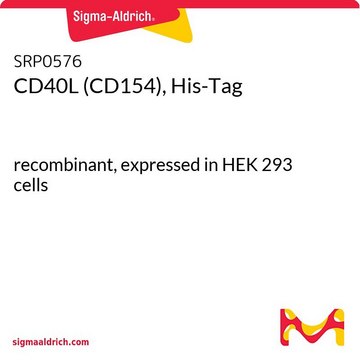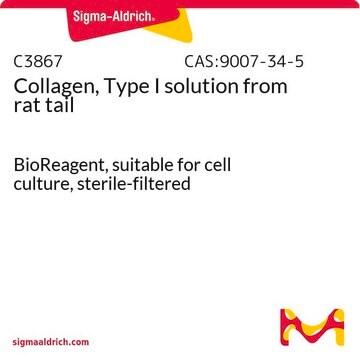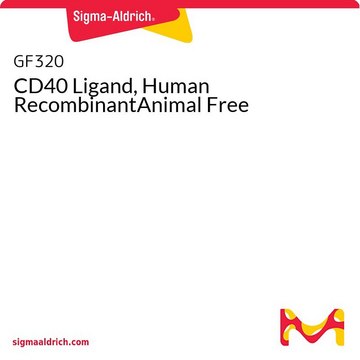SRP8044
CD40L, Soluble human
recombinant, expressed in CHO cells, FLAG® tagged, >95% (SDS-PAGE)
Synonym(s):
ACRP30headless:CD154, ACRP30headless:CD40L, ACRP30headless:TNFSF5, ADIPOQ-CD40L
Sign Into View Organizational & Contract Pricing
All Photos(1)
About This Item
UNSPSC Code:
12352200
NACRES:
NA.77
Recommended Products
biological source
human
recombinant
expressed in CHO cells
tag
FLAG® tagged
assay
>95% (SDS-PAGE)
form
lyophilized
mol wt
35-40 kDa by SDS-PAGE
packaging
pkg of 10 μg
storage condition
avoid repeated freeze/thaw cycles
impurities
<0.01 EU/μg endotoxin, tested
UniProt accession no.
shipped in
wet ice
storage temp.
−20°C
Gene Information
human ... CD40LG(959)
General description
CD40L (cluster of differentiation 40 ligand) belongs to the tumor necrosis factor (TNF) family, and is expressed by basophils, B cells, monocytic cells, natural killer cells, platelets, mast cells and T cells. It is predominantly expressed on pro-inflammatory T cells. It also exists in a soluble form.
Biochem/physiol Actions
CD40L (cluster of differentiation 40 ligand) is active in its membrane-bound form. It interacts with CD40 and functions as a proinflammatory and procoagulant agent. The serum levels of soluble CD40L is elevated in malignant middle cerebral artery infarction (MMCAI) patients, especially in non-surviving patients.
Physical form
Lyophilized from PBS
Reconstitution
Reconstitute with 100 μL deionized water.
Other Notes
Human CD40L (aa 116-261) is fused at the N-terminus to mouse ACRP30headless (aa 18-111) and a FLAG®-tag.
Legal Information
FLAG is a registered trademark of Merck KGaA, Darmstadt, Germany
Storage Class
10 - Combustible liquids
wgk_germany
WGK 2
flash_point_f
Not applicable
flash_point_c
Not applicable
Choose from one of the most recent versions:
Already Own This Product?
Find documentation for the products that you have recently purchased in the Document Library.
Association between Serum Soluble CD154 Levels and Mortality in Patients with Malignant Middle Cerebral Artery Infarction.
Lorente L, et al.
International Journal of Molecular Sciences, 16(6), 12147-12158 (2015)
Two adjacent trimeric Fas ligands are required for Fas signaling and formation of a death-inducing signaling complex.
Holler N, et al.
Molecular and Cellular Biology, 23(4), 1428-1440 (2003)
Our team of scientists has experience in all areas of research including Life Science, Material Science, Chemical Synthesis, Chromatography, Analytical and many others.
Contact Technical Service







